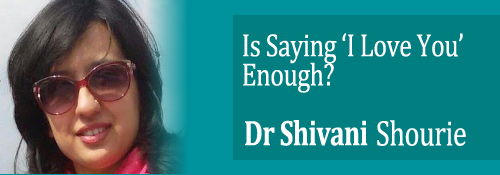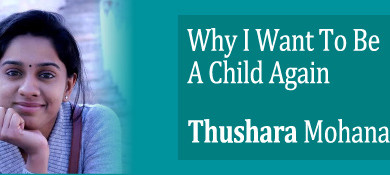Is saying ‘I love you’ enough?
We all love our children and are crazy about them. There is no doubt to it. So how eloquently and how frequently we say it out aloud or not, should not matter. But it does. Not only that, it also matters whether you express love and appreciation for specific qualities or actions.
We are very particular in pointing out the mistakes committed by our children.
‘That was not appropriate.’
‘You should never do that.’
After all, it is our job as parents, to ensure that children learn all the good habits and stay away from the bad ones. Nothing wrong with pointing out flaws if the intention is improvement. It is not that you do not appreciate your child. You do it vehemently and show it by showering her with kisses and saying ‘I love you’ a dozen times a day. It should constitute the perfect balance. I believed in it too, till my daughter made me realise that it doesn’t.
A fauji kid is supposed to be very mannered and is expected to churn up ‘Good evening uncle’, ‘Good evening aunty’ at the first sighting of her father’s colleague and the colleague’s wife. When my daughter stubbornly refused to acknowledge any uncle or aunty, it was an embarrassing situation. I tried explaining, it didn’t work. I tried bribery, it still did not. I gave up but made it a point to express disappointment every time she didn’t. One fine day, little missy decided it was finally okay to greet others and did so without even being asked to. I was happy and ‘I love you’ spontaneously came out of my mouth.
‘That is what you always say.’ She said. I was surprised at the look of dismay on her face. When I asked her the matter, she replied,’ When I do something bad, you scold me so much but when I did a good thing, you just said I love you.’ She was expecting more. She was right actually. I learnt a lesson in parenting from my child that day.
‘I love you’ is not enough.
Maybe the right thing to say would have been,’ It was very nice of you to wish uncle. It is a good habit to greet others on meeting them. I am proud of you.’ Being specific in appreciation is as important as appreciation itself.
When your child hits someone, it is important for you to make her realize that it was wrong and make her apologize. When she apologizes, it is pertinent that you appreciate the effort, not by saying ‘Good girl’ but by commenting,’ It was very brave of you to own up your mistake and apologize.’
When she toils hard to study for a difficult exam and fares well, do not say, ‘You are the smartest!’ Instead, appreciate the effort she put in. ‘You worked very hard for it; you deserve the grade.’
If your child participated in a race but lost, do not say, ‘It is okay that you didn’t win.’ Say, ’You acted like a true sportsperson by not giving up and completing the race.’
While appreciating your child, do not generalize. Try to focus on a particular skill, quality or effort. It makes the child realize that you actually observe her and mean the words you say. Using general comments reduces the value of those words, no matter how genuinely you mean them. ‘I love you’ is your way to express love for your child; do not use it as means of appreciation. Children are smart little people and our words mean much more to them than we realize. Their vocabulary in speech may be limited but is definitely not so when it comes to understanding.
Not only is it important that we criticize children less and appreciate them more, how we appreciate them is also of paramount importance and goes a long way in building up self-confidence. Therefore, right them when they go wrong and say ‘I love you’ as many times as you want, but appreciate them genuinely and specifically. You shall see the difference yourself, just as I did!
A doctor, a healthcare administrator, an ever travelling army-wife and a hands-on mom who loves to bake, Dr Shivani Shourie gives multitasking a new definition. As if this wasn’t enough, she has recently taken up her long neglected passion for writing as well and is now juggling it all! Her writings are inspired by real life as she believes that everyone and everything around us has a unique story and someone must do the justice of weaving it into words. Shivani blogs at The Solitary Saunter.


